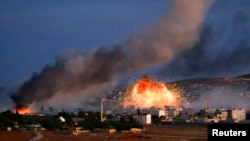In a reversal of policy, Turkey said Monday it allow Iraqi Kurds to use Turkish territory to support the besieged Syrian Kurdish city of Kobani. The announcement comes after U.S. forces air-dropped military supplies into the city currently under assault by Islamic State militants.
Turkish Foreign Minister Mevlut Cavusoglu said the Iraqi Kurdish fighters, known as Peshmerga, can cross Turkey's border with Sryia to join the fight for Kobani.
"We are helping the Peshmerga cross into Kobani," he said, speaking through an interpretor. "Our discussions are still under way."
With Kobani under fire on three sides by Islamic State forces, the Turkish frontier is the only possible ground entry for resupplying the border city.
Cavusoglu refused to give any further details on how many fighters and weapons will be given the green light to cross the border. But he said Ankara wants to eliminate threats along the region and is assisting the U.S.-led coalition fighting IS jihadists.
"We are fully cooperating with the coalition with respect to Kobani," Cavusoglu said. "We want to eliminate all kind of threats in the region and we see the military and medical aid, outfitted by our Iraqi Kurdish brothers and airdropped by the United States to all groups defending Kobani, from that perspective."
In Kobani, Syrian Kurds, known as the PYD, are calling for heavy weapons, in particular anti-tank missiles, to counter Islamic State tanks.
Ankara has been hesitant in allowing Peshmerga into Kobani to help the PYD. That's because Turkey accuses the PYD of being linked to the PKK, a rebels that both Ankara and the United States describes are terrorists. The PKK has fought for greater Kurdish rights in Turkey for three decades. On Saturday, Turkish president,Recep Tayyip Erdogan, made clear it believes the two groups have strong ties.
“At the moment, the PYD is equal with the PKK for us. It is also a terrorist organization," Erdogan said.
Soli Ozel, international relations expert of Istanbul’s Kadir Has University, says Ankara may be looking to the Iraqi Kurdish fighters to mitigate the influence of the PKK in Kobani.
"They obviously trust the Iraqi Kurds more, because the Iraqi Kurds are more conservative and Iraqi Kurds were the Turkish government's partners in fighting the PKK as well."
But analysts claim that while divisions remain between the rival Kurdish political factions across the region, the onslaught of the Islamic State has brought them closer together.
U.S. airdrops
Ankara’s change of heart follows a U.S. drop of military and medical supplies into Kobani early Monday.
The airdrops, the first in the fight for the border town, were "intended to enable continued resistance against ISIL’s attempts to overtake Kobani," the U.S. Central Command statement said. The acronym is another name for the Islamic State group.
A Turkish foreign ministry official said on Monday that Turkish airspace was not used during the airdrops carried out by the United States.
Senior officials told reporters that President Barack Obama notified Erdogan during a conversation late Saturday that the military would carry out the airdrops.
Secretary of State John Kerry said it would have been "irresponsible" and "morally very difficult" for the United States to not support the Kurdish fighters.
However, Kerry acknowledged Turkish concerns about support for the Kurds, and said the airdrop of supplies provided by the Kurdish authorities in Iraq did not amount to a change of U.S. policy.
“We understand fully the fundamentals of (Ankara's) opposition and ours to any kind of terrorist group, and particularly, obviously, the challenges they face with respect to the PKK,” Kerry told reporters on Monday.
But he added: “We cannot take our eye off the prize here. It would be irresponsible of us, as well as morally very difficult, to turn your back on a community fighting ISIL.”
The officials described the people of Kobani as being at risk of massacre, and said delivering supplies was not only a humanitarian mission but also a way to strike a blow against the militants.
VOA Correspondent Scott Bobb, who is reporting from the Turkish side of the Syria-Turkey border near Kobani, said a few explosions could be heard in Kobani Monday morning.
Syrian refugees who had spoken with family and friends still in Kobani told VOA that the airdrops of weapons and medical supplies give them hope and they see the action as a vote of confidence from the U.S.-led coalition.
Observers say those supplies, along with intensifying U.S. air strikes increases the likelihood that Kobani will resist Islamic State forces.
Airstrikes
The U.S. military conducted six airstrikes against Islamic State militants near Kobani on Sunday and Monday, U.S. Central Command said in a statement.
U.S. forces, in coordination with Iraqi ground troops, also conducted six airstrikes against the militant group in Iraq near Fallujah and Bayji with help from France and the United Kingdom, the statement said.
The U.S. statement said 135 U.S.-led airstrikes near Kobani have helped slow the Islamic State group’s advances in a battle the Pentagon insists has left hundreds of jihadist fighters dead.
Also Monday, Egyptian Prime Minister Ibrahim Mehleb said the country has no plans to provide the United States with direct military assistance in its war against Islamic State militants in Iraq and Syria, even though American aerial bombardment may not be enough to defeat the group.
But Mehleb left open the possibility of military action if Cairo's Gulf Arab allies are threatened by the al-Qaida offshoot.
US seeks help in Asia
In Indonesia, where he attended the inauguration of new President Joko Widodo, Kerry on Monday sought support in Asia for the fight against Islamic State militants, specifically ways to disrupt the recruitment of foreign fighters.
He met with officials from Indonesia, Australia, Brunei, Malaysia, the Philippines and Singapore.
Scott Bobb contributed to this report from Turkey.




